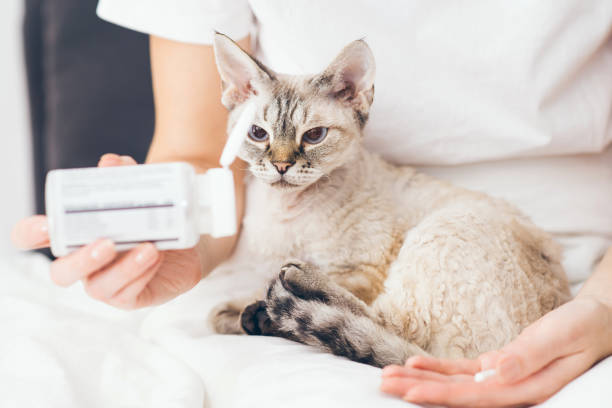Pet Diabetes
Pets with diabetes may require specialized care and medication, including regular doses of insulin, to maintain their day-to-day health.
What is Pet Diabetes?
Pet diabetes, also known as diabetes mellitus, is a condition where the pancreas cannot produce enough insulin. Insulin is a hormone needed to transfer glucose (blood sugar) into cells and produce energy.
A lack of insulin leaves chronically high glucose levels in the blood, potentially leading to diabetes and liver and kidney problems. To catch diabetes early, regular diagnosis and treatment from our veterinarian in Wayne are crucial.
Pets with diabetes typically require treatment and disease management throughout their lives. Visit your vet often and schedule an extra visit if you should notice any changes in your pet’s behavior or energy level.

Risk Factors for Pet Diabetes
Older, overweight cats are the most likely to develop diabetes. Diabetes occurs somewhat less often in dogs, hamsters, other small mammals, and birds. Diabetes in reptiles is fairly unlikely.
Besides species, the following factors make diabetes more likely to occur in your pet:
- Obesity
- Lack of exercise
- Unhealthy diet
- Genetics, heredity
- Pancreatic inflammation
- Hormone therapy
- Immune disorders
Symptoms of Diabetes in Pets
Animals with diabetes must break down fat for energy, which is more difficult than breaking down sugar and results in weight loss.
Diabetes symptoms in pets generally include:
- Increasing thirst and hunger
- More frequent urination
- Weight loss while eating normally
- Cataracts (in dogs only)
- Weakness
- Shortness of breath
- Depression
- Nausea and vomiting
- Ketoacidosis (This means waste products accumulate in the blood, and it is an emergency. The symptoms are sudden, severe appearances of the above conditions. See your vet in Wayne immediately.)
How Your Vet Manages Diabetes in Pets
Pet diabetes is not yet curable, but with proper veterinary care, your pet will still enjoy a very comfortable life. Your vet in Wayne can develop a plan to keep the condition under control with proper exercise and certain diet changes or restrictions.
If necessary, our vet will determine the best type of insulin to treat your pet’s diabetes and help prevent complications. Dogs are more likely to require insulin injections, while cats may require short-term injections and may then often be managed with a specialized diet. Pets should see their veterinarian in Wayne regularly for blood sugar tests and medication adjustments if necessary.
Contact Radnor Veterinary Hospital for Diabetes Diagnosis and Treatment
If your pet needs a checkup or shows symptoms of diabetes, visit our veterinary hospital for an exam. We will evaluate your pet for signs of diabetes, conduct blood testing to confirm the diagnosis and create a custom treatment plan. Radnor Veterinary Hospital cares for pets with diabetes in Wayne, Bala Cynwyd, Bryn Mawr, King of Prussia, Villanova, Norristown, Paoli, Plymouth Meeting, and surrounding areas of PA. Call us at (610) 687-1550.

